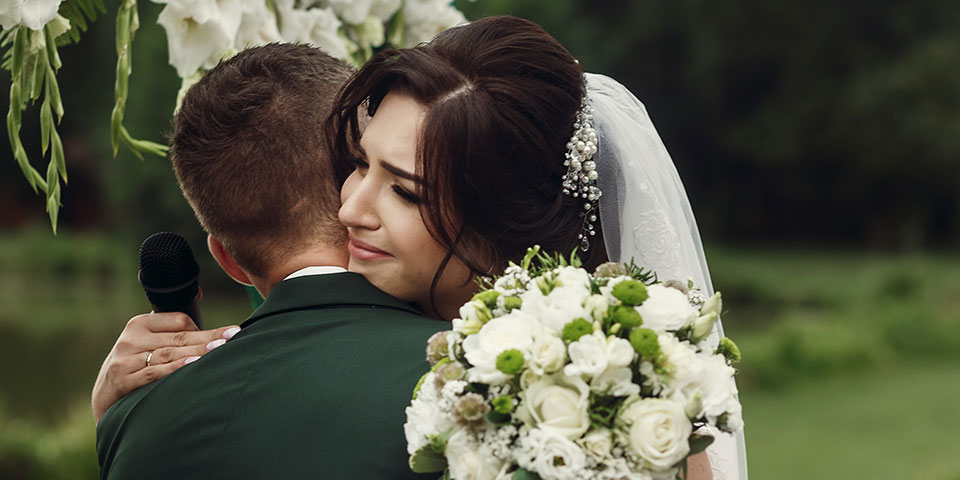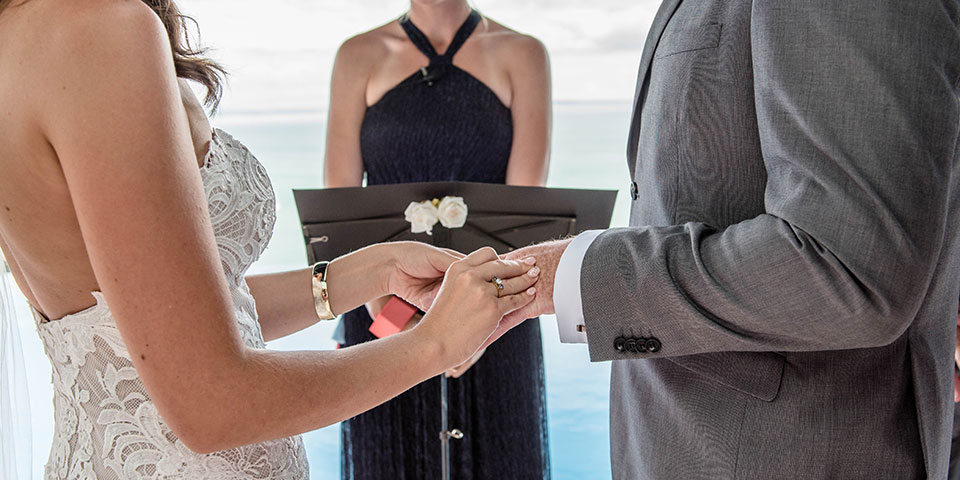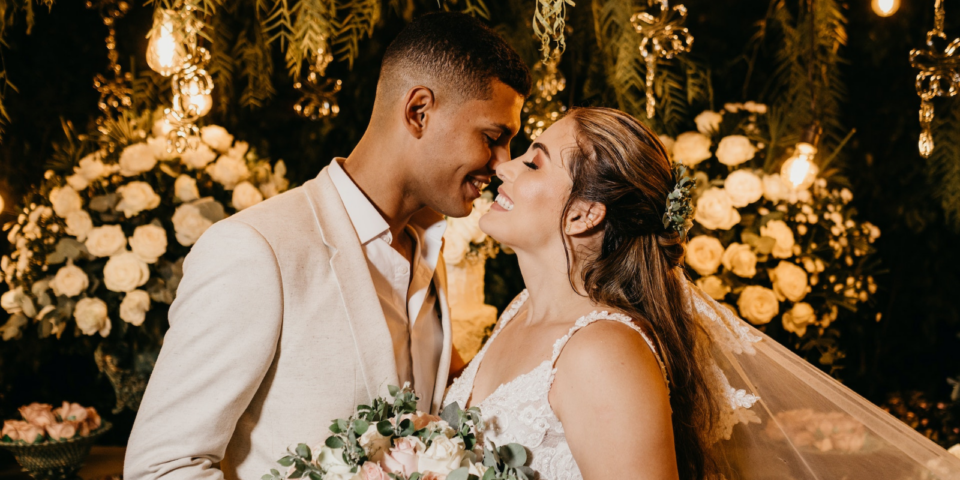Let’s be honest – exchanging your wedding vows will simultaneously be one of the most incredible and nerve-wracking moments from your special day.
After all, your vows are essentially a reminder of what this celebration is all about: making a lasting commitment to the love of your life. It’s kind of a big deal, and one that comes hand in hand with a whole lot of pressure!
Writing your wedding vows can feel like one seriously intimidating task, especially if you aren’t a natural wordsmith. The good news is, finding the perfect way to express your emotions doesn’t have to be so difficult. In fact, you might even enjoy the process once you know how to get started!
If you’re currently stressing out over writing your wedding vows, we’ve rounded up some of our most helpful tips to get the inspiration flowing. Keep reading for a step-by-step guide to crafting the perfect vows for your big day.
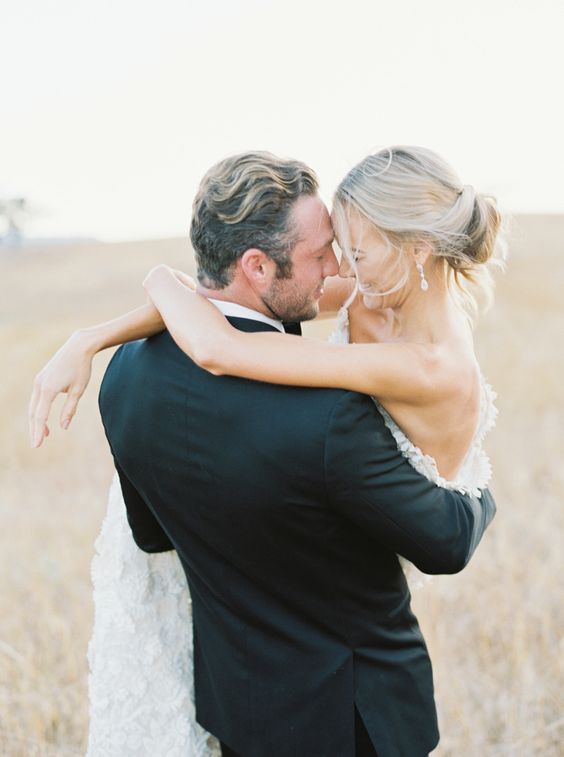
Choose Your Wedding Vow Approach
Have you considered the direction you want to take when it comes to exchanging your vows?
Your approach to writing your wedding vows will all depend on your vision for the day and your own personal preferences. You can either choose to write and share the same vows as your partner, or work on individual vows that are shared on the day.
Before putting pen to paper, you might want to consider the pros and cons of each option to make a decision that feels right for you.
Sharing your vows with your partner can definitely be the easier option. Not only does it take away some of that unwanted pressure, but it also allows you to include any important promises that hold significant meaning to the both of you.
However, this option does remove the element of surprise on the day, and may come across as less personal.
Alternatively, writing your own wedding vows can feel intimidating, and tends to put more pressure on you both individually. With this in mind, there is something undeniably special about hearing your partner’s vows for the first time during your ceremony (and seeing their reaction to your own!).
It’s best to sit down with your partner and talk through both options to determine which approach is going to be the best fit. If you haven’t already defined your overall wedding vision, this might be a helpful place to start!
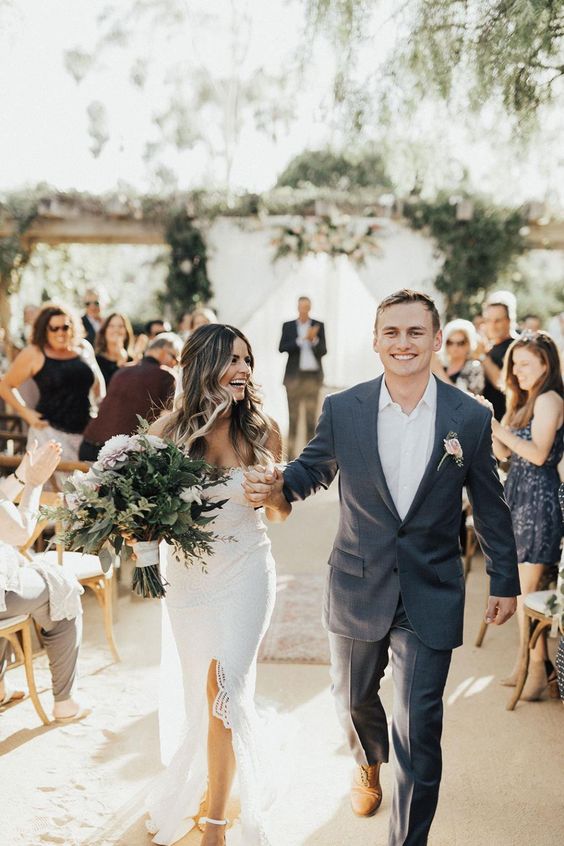
Agree on Format and Tone First
What kind of tone do you want your vows to convey on the day?
Whether that’s serious and sentimental or light-hearted and humorous, it’s best to agree on the tone of your vows upfront to ensure you and your partner are on the same page. You don’t want to spill your heart out in a tear-jerking speech only to have your partner respond with playful jokes!
If you’ve chosen to write your own individual vows, consider creating a generic template or format that you can both follow. This will help to ensure your vows are similar in length, style and tone, while still giving you the element of surprise on the day.
An example template might be something like:
- Your initial impression of your partner
- 3 traits you love about them
- A special memory you share
- 3 promises or commitments
- Something you’re looking forward to in the future
Alternatively, you can create a vow template with specific sentence starters, like:
- When we first met…
- I love the way you…
- I’ll never forget…
- I promise to always…
- I can’t wait for…
Working from the same template will not only ensure your vows “flow” cohesively, but also make the writing process much easier.

Brainstorm Ideas
A brainstorming session is an important first step in the vow writing process. This step is essentially all about getting your thoughts, feelings and emotions out of your head and onto a piece of paper.
When it comes to your initial brainstorming session, don’t put too much pressure on yourself. Simply grab a notebook or journal and start jotting down anything that springs to mind when you think about your partner.
Some prompts to consider include:
- Your favourite memories and experiences shared together
- Any traditions or rituals in your relationship
- When, where and how you met
- Quirky personality traits
- Things that make them unique
- Ways they inspire you
- Adjectives that best describe them
- What you appreciate the most about them
- How your relationship has evolved
- How you picture your future together
As you’re brainstorming, try to identify any words, phrases or memories that feel especially meaningful to you. These will form a great base to build from when it comes to expanding on your vows in more detail.
Remember, the most memorable vows are often the ones that include a mix of both playfulness and seriousness. Try to find a balance between the two as you begin to brainstorm and pull ideas together!
Getting into a comfortable and relaxed state of mind during your brainstorming session is also important. Find a quiet room and light some candles, or take your journal to a significant place that holds special meaning to your relationship. Writing your vows is a personal and often emotional experience, so make sure your surroundings reflect this.
Research Vow Examples Online
As you get further into the process of writing your vows, there may be times when you feel stuck or simply uninspired. This is where some online research can really come in handy to overcome that dreaded writer’s block!
Obviously, your vows should be unique and personal, but sometimes a little creative inspiration is needed to get the ideas flowing. You’d be surprised how many wedding vow examples are freely available on search engines and even Pinterest.
Take some time to research some different vow examples online. You can even narrow down your search using phrases like “romantic wedding vows” or “playful wedding vows”, depending on the format and tone you’ve chosen.
During this research, you might find certain quotes or turns of phrase that you resonate strongly with. Don’t be afraid to draw inspiration from any sentiments that you connect with on a personal level, and incorporate them in a way that feels right for you.
Chances are, the more vow examples you read, the more confident you’ll feel about starting your own. You don’t need to copy anything word for word, but it’s a great way to get the ball rolling!
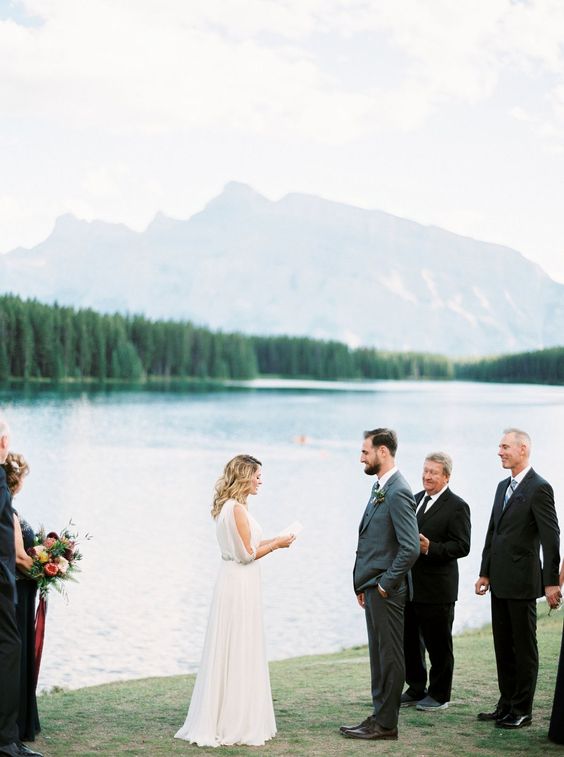
Edit out Loud
Following your brainstorming and research sessions, you should have enough material to begin drafting up your vows. Now it’s time to start editing and creating that perfect final copy!
The best way to edit your wedding vows is by reading them out loud. Take note of how you feel as you read through your vows – they should sound genuine, natural and sincere.
If there are certain sentences that seem stiff or clichéd, think about how you could rephrase them in a way that feels more authentic and conversational. Instead of thinking about your vows as words on a piece of paper, imagine that you’re speaking directly to your partner instead. This should help you write vows that feel true to yourself and your relationship.
You’ll also want to consider the length of your vows as you read them aloud. There’s no “one size fits all” rule, but a couple of minutes is generally recommended as an ideal length to fit in with your ceremony.
Once you’ve completed your first draft, leave it alone for a few days before revisiting it with a fresh pair of eyes. Realistically, it will probably take a few revisions before you feel one hundred percent confident with your final copy, and that’s totally okay!
Give Yourself Plenty of Time
Writing your vows is an in-depth process that requires time and patience. So whatever you do, try not to leave your vows until the last minute!
Procrastinating on your wedding vows will only end up putting more pressure on yourself, and leave you feeling stressed and anxious in the lead up to your day.
Instead, try to get a start on your vows at least 6-8 weeks before the wedding. This timeframe should allow you to brainstorm, edit, and finalise your vows by the 3-week countdown.
And once you feel comfortable with the end result: put the pen away! Use those last 3 weeks to practice reciting and learning your vows, rather than obsessively rewriting them. You don’t want to confuse yourself on the day by fumbling over last-minute changes and revisions.
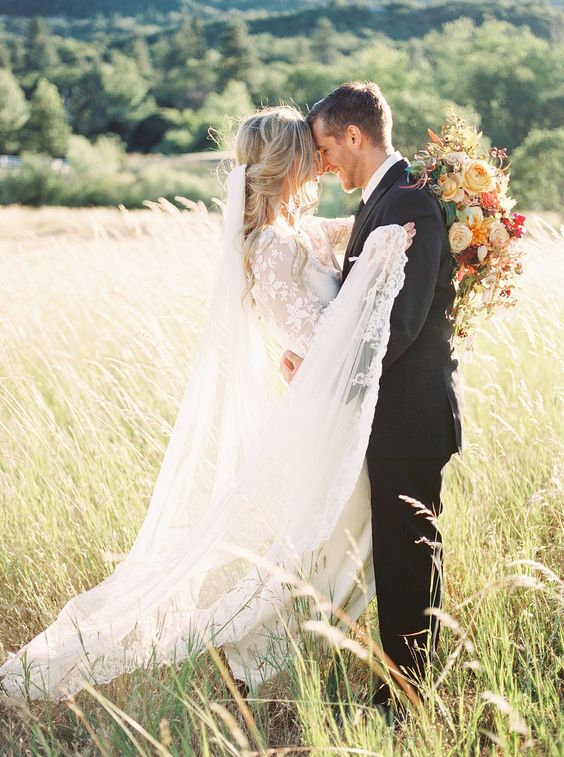
Just Be Yourself!
As intimidating as it might seem, writing and exchanging your wedding vows will truly be one of the most beautiful moments from your entire celebrations.
From identifying your tone of voice through to effective brainstorming strategies, simply use these tips as a helpful guide and you’ll be well on your way to creating the perfect vows for your special day.
One final tip? Just be yourself! Stay true to who you are and think honestly about your relationship and what marriage means to you.
Although it might feel like a whole lot of pressure at the time, trust us – you’ll look back on this moment with happy tears and warm, fuzzy feelings for years to come!
